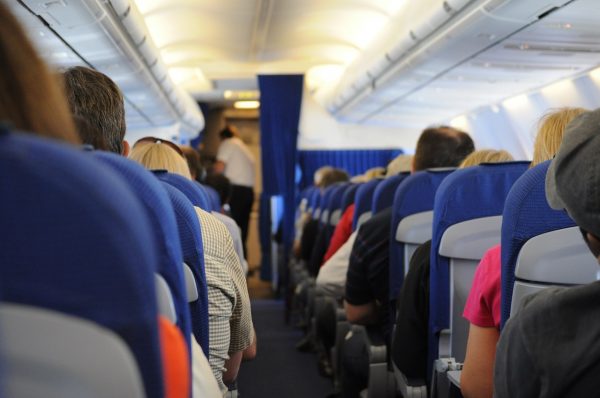Well, it’s that time of year again. People are packing their bags and getting ready to hop on a flight to visit family and friends for the Christmas holiday.
According to a survey conducted by The Vacationeer, a travel website, approximately 50% of U.S. adults are expected to travel for the holiday this year. So, in the coming days millions of Americans will be flooding to the airport; all of them hoping to avoid long delays and cancellations.
Holiday travel is always stressful. And if you are traveling across time zones, the fatigue, irritability and digestive issues that accompany jet lag can compound that stress… the last thing you need if you want to truly enjoy the festivities.
While there is no way to avoid jet lag altogether, there are ways to lessen the impact.
What Causes Jet Lag?
Jet lag begins the minute you walk onto the airplane.
First, airplane cabins typically maintain a humidity of around 20% or less, which makes dehydration a major issue when traveling by airplane.
Second, the cabins are set at about 75% of atmospheric pressure. This lowers the oxygen levels in your blood and can make you feel tired, off-balance and headachy. It also affects your body’s natural clotting response.
The effects of dehydration and low oxygen levels can last for days after a flight. And while neither of these are the main cause of jet lag, they contribute to it.
This is why I always recommend avoiding salty foods and drinking plenty of water before, during and after your flight to fend off dehydration. I also advise patients to take a walk up and down the aisle every half hour or so to improve respiration, increase circulation, and boost blood oxygen levels.
Your main enemy when it comes to jet lag is your circadian rhythm, or your master time clock. It works on a light/dark cycle that’s synced to the time zone where you live.
So it’s easy to see how it can be connected to some of the tiredness that’s generally associated with jet lag. This is especially true when you travel from west to east, because the time change runs in direct opposition to your body clock.
But it’s more than that.
Your circadian rhythm is closely intertwined with your metabolism (digestion, hormone metabolism, energy expenditure and so on). This can account for the upset stomach, mood changes, apathy and lethargy that are so common after flying across time zones.
The thing is, not all body systems work on the same internal clock. Different organs, cells and body functions each have their own clocks, which are coordinated and synced by a master clock.
When you travel from one time zone to another, it results in “circadian misalignment,” throwing the entire system out of balance.
Eat a Hearty Breakfast to Reset Your Time Zone
A study published in the September 2023 journal Chaos reports that there is a way to reset your circadian rhythm to re-sync all of your body clocks more quickly.
In addition to exposing yourself to sunshine first thing in the morning to re-set your light/dark cycle, eating meals on a schedule can help to realign the body’s internal clocks.
In particular, the researchers found that if you eat at night when your brain thinks it is supposed to be resting, it further confuses your time clocks and causes dysregulation. But when you wake up in the morning and eat a hearty breakfast, it works to realign the clocks.
This makes a lot of sense, because morning is when you really need to energize your cells, kick up your brainpower and get your energy stores in place for the day. Night-time is when you want to slow things down.
I recommend making healthy fats the focal point of breakfast. They will provide you with a steady source of energy to fuel your activities throughout the day. You can include a high-quality protein and some plant-based carbohydrates, but make fat the star of the meal.
Some good choices of healthy fats include eggs, wild-caught fatty fish, avocados, plant-based yogurt, nuts, seeds, coconuts and grass-fed beef. Include some plant-based carbohydrates to help support your fiber needs.
By the time lunch rolls around, you are hitting your most active time of the day. This is where you want to make protein the hero on your plate.
Some great low-fat sources of animal protein include poultry, shellfish, pork and white-fleshed fish.
When it comes to plant-based proteins, you can’t beat legumes like beans, peas and lentils. Soy-based proteins include tofu, tempeh and edamame.
And on the grain side of things, you’ve got quinoa, amaranth and buckwheat.
Since protein isn’t stored the way fats and carbs are, we need a steady source of it all day long. That’s why I also like to get some protein in between meals, like lean turkey, chicken or cheese with a celery stick or gluten free cracker.
Dinner is where the carbs come in.
When you eat non-starchy carbs later in the day, they help balance blood sugar and insulin levels, and boost the production of your satiety hormone. They also play a role in the regulation of hormones that help you fall asleep.
This is a great reason to load your dinner plate with organic, non-starchy veggies from any and all colors of the rainbow.
Remember, shifting meal schedules and eating at night can mess with your internal clocks, especially while jet-jagged. So start a meal schedule the day of your arrival, and stick with it for faster resolution of jet lag symptoms.
SOURCES:
Christmas Travel Survey 2023 – 50.44% (131 million American adults) to Travel for the Holidays; 59%+ Expect Airline Delays & Cancellations. The Vacationeer. Dec 2023.
Synchronizing Your Internal Clocks May Help Mitigate Jet Lag, Effects of Aging. AIP Publishing. News Release. Sept 2023.
Huang Y, Zhang Y, Braun R. A minimal model of peripheral clocks reveals differential circadian re-entrainment in aging. Chaos 1 September 2023; 33 (9): 093104.




